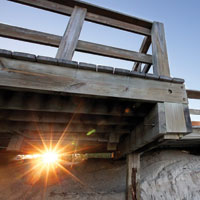 City moves to stabilize dunes under boardwalk at Conn Way
City moves to stabilize dunes under boardwalk at Conn Way
STORY BY LISA ZAHNER, (Week of January 26, 2012)
Photo: Storms washed away sand, undermining the boardwalk.
The City of Vero Beach is going ahead with a $93,000 project to stabilize the dunes under the boardwalk at the southernmost end of Jaycee Beach – across from the eastern end of Conn Way – despite the fact city officials don't know for sure where they will get the money.
Last season's storms, especially the unnamed Columbus Day weekend storm, chewed up the beaches and dunes under the boardwalk, leaving gaping holes where there is no sand at all under the walkway. To protect the boardwalk, the road and adjacent condominiums and businesses, the dunes are periodically padded, but last year's project only required 450 tons of sand.
About 1,200 linear feet of beach will be closed for two weeks while the work is being completed, according to Public Works Director Monte Falls.
"We had a permit but we had to make some minor revisions to it and we've sent that off, so we should have a permit within the two weeks," Falls said. "Once we get the permit in hand, then the insurance and bonding will take another two to three weeks, so I would guess that we'd be looking at the middle of February."
The Vero Beach City Council voted to enter into a contract with the low bidder, Mancil's Tractor of Stuart, to place 7,200 tons of beach-quality sand on the dunes under the boardwalk. On top of the price of $10 per ton for processed and delivered sand, the city will pay $2.25 per ton for the spreading of the sand, plus $1,000 for mobilization, $500 for site restoration and $3,500 to rake and till the beach after completion.
The sand will be trucked in from one of the four mines originally approved to supply sand to the Indian River County project.
Falls said Mancil's Tractor will submit samples from either the Stewart mine of St. Lucie County, the Henry Fischer mine, the Brian Davis mine in Sebastian or the Ranch Road Lake mine west of the Quail Valley Golf Club.
City Manager Jim O'Connor said he would look into sources of funding, including knocking on Indian River County's door for a share of the bed tax money collected from Vero Beach hotels and motels.
Councilman Jay Kramer said last week that Vero should be eligible for a portion of the bed tax revenue because Vero beaches are "next in line" for beach replenishment.
According to Indian River County Director of Management and Budget Jason Brown, the county doesn't have large pots of money lying around for new beach or dune replenishment projects.
"Over the past five years, the county has spent $8.1 million of the one-cent sales tax money from the unincorporated area – not from the city – on beach renourishment, plus $500,000 per year of the bed tax money," Brown said. "We would consider their request if we receive it."
After the city approaches the county for the money, the staff would have to take a look at it and make a recommendation to county commissioners. After a cursory glance at the money situation, Brown did not sound hopeful about recommending approval of such a request from Vero.
"This year, we have $2.4 million in the budget for beach renourishment and most of that will be for Sector 3, plus we've been asked to look at spending $150,000 to $200,000 for the PEP reef study. We don't have a large amount of surplus funds available and we're already dealing with the PEP reef study, so this would be another unbudgeted item."
Vero Beach Finance Director Cindy Lawson will need to draft a budget amendment of more than $81,000 to bring to the City Council to put money in the budget to pay for the project, but the line item does not yet have a revenue source attached to it.
Some of the money that would have gone to pay to fix the dunes was shifted over to the Recreation Department last summer during budget workshops to keep lifeguards on select city beaches.
The dune work must be completed prior to the start of sea turtle nesting season May 1, but the matter of funding the sand contract could drag on past the project's completion.
"They (the City Council) approved us moving forward and doing a budget amendment but to explore funding options," Falls said. "There's no new revenue source, it would need to come from either savings from other projects or from reserves."
The city very carefully calls this project "emergency dune restoration" because it is not legally permitted to do beach restoration. Voters approved a prohibition in the city charter against spending city tax dollars on beach replenishment, so Indian River County took over responsibility for sand projects countywide.
The Conn Way beach project and other small projects like it get around that rule because the sand is placed only on the dunes and not spread on the low, flat part of the beach.








